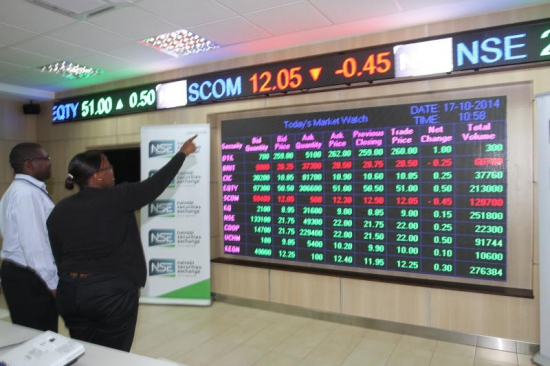Shrinking stock prices has caused Kenyan bourse to loss its sparkle of yesteryears, now attracting a small number of local investors as potential ones keep off.
Kenyans used to flock to stock brokerage firms to open Central Depository and Settlement (CDS) accounts and invest in stocks.
The East African nation’s citizens mainly invested in stocks of homegrown firms that include Safaricom, Kenya Power, Kengen, Kenya Airways and Mumias Sugar.
A majority of the stocks are currently trading below the initial public offer price save for a few like Safaricom, Kenya’s leading telecom, Equity Bank and Kenya Commercial Bank (KCB).
The worst hit sectors include insurance, where Britam on Monday traded at a low of 8 shillings (0.08 U.S. dollars), Corporate Insurance Company (CIC) 0.03 dollars and Liberty 0.1 dollars.
Kenya Power and Kengen in the energy sector, initially the best blue-chip stocks at the stock market, are trading at lower than the initial public offer price.
The former traded at 0.04 dollars and the latter 0.06 dollars on Monday, the price they have stayed put since the start of the year.
Kenya Airways in the transport sector and Mumias Sugar in manufacturing are the other worst performing stocks as the companies continue to chalk up losses. On Monday, the stocks traded at 0.03 dollars and 0.003 dollars respectively.
Some of the better-performing stocks include Safaricom, which traded on Monday at 0.27 dollars, over five times the IPO price, while Equity Bank and KCB traded at 0.39 dollars.
The general decline in prices of stocks has affected investors’ wealth, with market capitalization standing at 22 billion dollars on Monday, down from 26 billion dollars two years ago.
Ernest Manuyo, a business management lecturer at Pioneer Institute, attributed apathy of local investors towards the stock market to several factors, among them declining stock prices, reduced disposable income, lack of returns from previous investments and rising cost of living.
Fred Ajwang, a computer technician in Nairobi, who was initially enthusiastic about the stock market, said Tuesday, he cannot invest at the market due to low returns.
Ajwang, like many other small Kenyan investors, is looking at the debt market. Last month, he bought into part of the 2.5 million dollars mobile bond dubbed M-Akiba floated by the National Treasury.
One only needs 30 dollars to invest into the risk-free bond, making it appeal to many small investors, with the bond recording 30,232 new registrations, according to Rose Mambo, the chief executive of CDS Corporation.
Source




